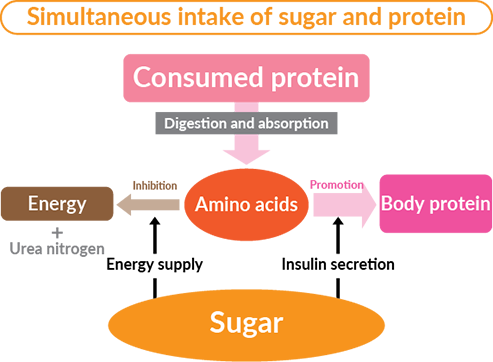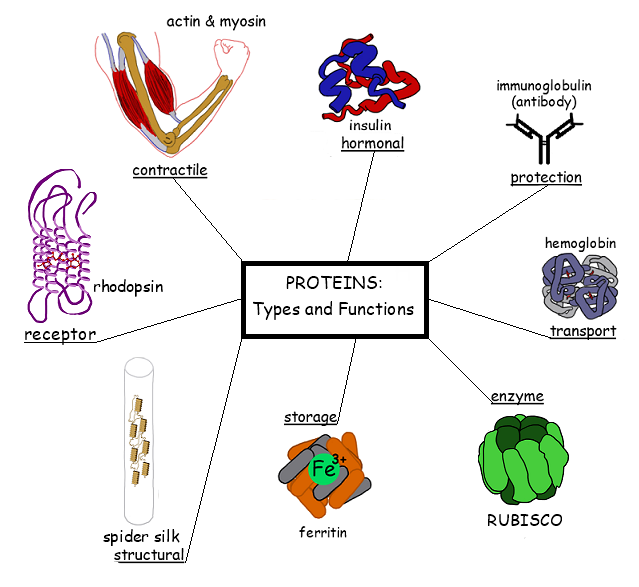Describe the Role of Protein in the Body
Whereas the amino acids are transferred into the bloodstream to be transported to the liver and. The Recommended Daily Allowance RDA of protein is 08 grams per kilogram of weight per day for the average person.

Proteins Building Blocks Of The Body Otsuka Pharmaceutical Co Ltd
Protein is the building block of the human body.

. 112 Explain the organization of muscle fascicles and their role in generating force. Exercises like strength training cause. They can act as antibodies enzymes signal transmitters transporters or structural components in our cells.
Proteins are very important molecules that are essential for all living organisms. Nearly all enzymes are protein. The Roles of Protein in the Body.
Catalysing metabolic reactions DNA replication responding to stimuli and transporting molecules from one location to another. Here are 6 important roles that protein plays with our body 1. Protein is described the building block of the body.
Certain hormones such as insulin and glucagon are proteins Hormones are chemical messengers that regulate body processes and responses such as growth metabolism and hunger. Protein is necessary in building and repairing body tissues. They do most of.
It plays a crucial role in our growth and development. It also helps to repair and maintain. Building Cells Fighting Disease Proteins are large complex molecules constructed from a set of 20 amino acids of which eight must be obtained through diet and are not produced naturally by the body.
5 key functions of protein in the body Supports our immune system. Essential amino acids and non-essential amino acids supply nitrogen to the body. Proteins do more in your body than just help build strong muscles.
Protein is one of the most important substances in your body. Proteins are large complex molecules composed of smaller building units called amino acids attached to each other in long chains. Pregnant women need to increase protein consumption in order to facilitate their childs advancement.
Such proteins are digested to form amino acids required in the digestion and metabolism of animals. How much protein should we eat every day. Energy Protein is a major source of energy.
Aids growth and repair of cells After our body breaks dietary proteins down into amino acids it uses them to build and repair cells and tissue including muscle tissue. Enzymes which help speed chemical reactions in cells are a specialized type of protein. It is called this because protein is vital.
Hair skin eyes muscles and organs. The body uses the information stored in DNA to create proteins which are made up of subunits called amino acids. Proteins perform a vast array of functions within organisms.
083 gkg BW 58g 1 st trimester 1g per day 59g 2 nd trimester 9 g per day 67g 3 rd trimester 28 g per day 86g Breastfeeding 0-6 months 19 g. Protein also supports immune function. It makes hormones which act as messengers in our body.
Optimal protein intake depends upon our activity level and health. Higher protein intake has been found to help in lowering the blood pressure simultaneously. Crucial for growth and maintenance of tissues.
111 Describe the roles of agonists antagonists and synergists. Repair and Maintenance Protein is termed the building block of the body. There are many different types of proteins in our body and their functions vary.
This article contains a distillation of proteins main roles in the body. Protein plays various essential roles. Essential amino acids are required in the diet of animals depending on their specific needs.
Proteins are involved in virtually all cell functions and a different type of protein is devoted to each role with tasks ranging from general cellular support to cell signaling and locomotion. The predominant role of protein for exercise is to repair the microdamage that occurs to muscle and bone. One of the protein functions in the body has been found to be the fact that it helps in maintaining the blood pressure in the body.
Not getting enough protein is associated with weakened immunity. This is one of the main reasons why nutritionists recommend that bodybuilders eat protein-rich foods such. 114 083 gkg BW - Adults 18-65 years 083 gkg BW 58g Elderly 65 years 1 gkg BW 70g Pregnancy.
It is called this due to the fact that protein is vital in the upkeep of body tissue consisting of advancement and repair. Proteins are the body builders of the animal body. If you consume more protein than.
Your muscles hair eyes organs and many hormones and enzymes are primarily made out of protein. Enzymes speed up the rate of catalyze chemical reactions without becoming a part of the products. A small amount -- about 5 percent -- is used to fuel exercise.
What Protein Does for Us. By dry weight proteins are the largest unit of cells. They are present in every cell and tissue each one with a highly specialized function necessary for normal development and.
The amino acids that protein provides serve as fuel for the immune system and help build antibodies which fight off infection and other foreign invaders. If you do not receive enough protein in your diet muscles wasting and other symptoms may result. Protein also plays a crucial role in maintaining muscle tissue since muscle tissue has large amounts of protein.
5 rows Proteins are large complex molecules that play many critical roles in the body.

Ppt Dr Jonathan Spages The Importance Of A Balanced Diet Powerpoint Presentation Id 9794189 Balanced Diet Diet Protein Rich Diet

Functions Of Proteins 5 Main Functions What Where How

What Is Protein Proteins Are A Sequence Of Amino Acids Of The 20 Amino Acids That Exist 9 Are Essential Amino Acids And 11 Are Body Protein Protein Tyrosine
No comments for "Describe the Role of Protein in the Body"
Post a Comment